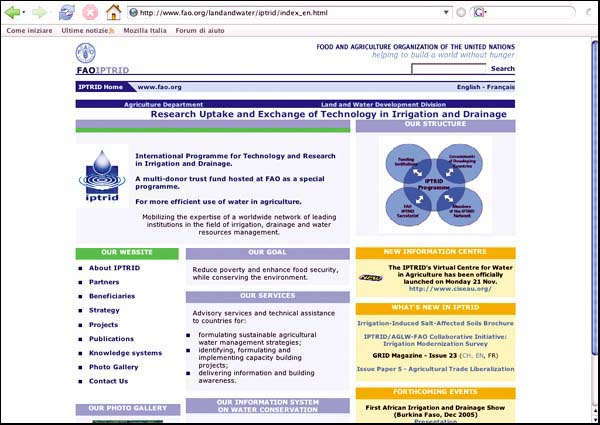
The idea of interviewing in every issue of GRID a person that is well versed with the subject of IPTRID's field of work, whether familiar or not with the Programme itself, is meant to add a new and interesting element for our readers. In this issue, however, our interviewee is not only a renowned water professional but also closely associated with the Programme in his capacity as Chair of our Consultative Group. In this position since 2000 hardly anyone else would be in a better position to address the questions that GRID has formulated. Mr Peter Lee, also the Director of Mott MacDonald in India and the President of the International Commission on Irrigation and Drainage, provides a candid view of IPTRID and its future.
What do you see as IPTRID's niche?
There was a very good debate on this at the Consultative Group meeting in Montpellier in 2003, when it was made very clear that IPTRID's particular niche was in facilitating the uptake of research and transfer of technology in irrigation, for the benefit of developing countries. After that meeting, this became referred to as IPTRID's central focus in seeking to develop the capacity of developing countries to sustain an increase in the productivity of irrigated agriculture.
What is your vision of IPTRID in the near and long-term future?
IPTRID is unusual in that it draws on the strengths of a network to deliver its objectives. The capabilities of the network partners gives it enormous potential strength but we have continually to remind ourselves of the need to mobilize the full potential of the network. My vision is of a network organization that will be seen as a model of what can be achieved by collaborative working, with greater ownership being taken by developing countries. At some time in the near future, we should consider moving the Secretariat of IPTRID to a developing country, again mobilizing the capabilities of the network already existing in those countries.
The recent Consultative Group meeting held in Beijing recommended a shift away from capacity development into a more research and technology oriented Programme. What is the rationale behind this?
As I have already indicated, the Consultative Group has always held that research and technology have always been the central focus of IPTRID, and these are the attributes that differentiate it from the many other organizations that undertake capacity development. The Triennial External Evaluation presented to the Beijing Meeting of the Consultative Group found that in order to attract more funding, IPTRID had placed much more emphasis on capacity development, and the “T” and “R” words in the programme's title were no longer central to its identity, in spite of what was said in the mission statement. The Evaluation confirmed that there was now a broad agreement that the emphasis on capacity development had undermined IPTRID's identity without adding much by way of additional financial support. The Consultative Group accepted this and came to the view that capacity development was a means by which IPTRID might improve the uptake of research and exchange of technology, but not an end in itself. If this is seen as a change then that is fair enough, but in my view it is reaffirmation of what was always IPTRID's role, brought up to date to reflect the importance of the dissemination of knowledge and bridging the gaps by means of technology, in the broadest sense, not just hardware.
Given the recent changes in IPTRID's mission, do you have a message for the Programme's potential donors?
I think the appeal of IPTRID to donors should be that it is network that adds value by acting as a bridge between developing countries and donors, in creating projects that are worthy of funding, and helping in the management of the process. Moreover, IPTRID is a network of organizations that can provide this service and therefore, it can draw on the best capabilities available. In practice, IPTRID has developed the reputation of being an “honest broker” between the aspirations of developing countries and the objectives and organizational constraints of donors, and this reputation is increasing as IPTRID strengthens its links with the developing world. This is not an easy role as those constraints are constantly changing, and the Triennial External Evaluation spoke of a mismatch of perceptions, expectations and needs of donors, network partners and developing countries, and emphasised the need for IPTRID to be close to the needs of developing countries. This in itself should make IPTRID more useful to donors, than merely echoing what the donors themselves already perceive.
There seems to be a proliferation of ‘special’ programmes like IPTRID. What makes IPTRID different?
See first question above.
What are the incentives for institutions/organizations to join the IPTRID Partnership Network?
I believe there are advantages for development and research organizations in both the developed and developing world. As the readers of Grid must be aware, there are several organizations which have been active in providing services to the IPTRID network. In the past, this was often associated with funding from the particular partner's government. Now the situation is becoming more flexible, with much of the funding being untied. The advantage to those service providers in being part of the network is that IPTRID is facilitator not a competitor, and dedicated to matching developing countries needs to donor priorities and network partner capabilities and resources. The capabilities of ICID as an IPTRID Central Partner, in supporting links to developing countries and to potential partners and donors is particularly important.
As President of ICID, what kind of relationship do you foresee and what support can you offer to IPTRID?
As the new President of ICID, I hope that I can help strengthen the role of ICID as a Central Partner of IPTRID. Already, the Commission is taking steps to rationalize its interface with IPTRID and it has been agreed that IPTRID will be a member of ICID's Permanent Committee on Technical Activities. I have no doubt that ICID and IPTRID can help each other, particularly as the ICID membership provides a point of contact for IPTRID in many developing countries, and IPTRID's interaction with ICID National Committees can help those committees in establishing themselves. IPTRID's networking with the nascent ICID National Committees in Mali, Bukino Faso and Niger was a recent example of this.
In conclusion, I would acknowledge that IPTRID faces big challenges and, in particular, it must strengthen its Secretariat, for which we need more support from the donors. However, the new Programme Manager, Carlos Garces, has already made tremendous progress and earned the wide support of those connected with IPTRID.
| Visit IPTRID web site at: www.fao.org/landandwater/iptrid/index.html |  |